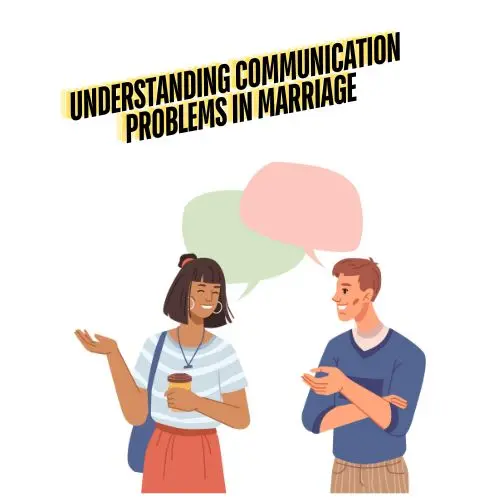Opening Thoughts
Communication is considered the key component to any relationship that is ever going to be successful. However, non-communication also had been one of the ages-old factors for creating problems in marriage and even Divorce. In this article, you will read about communication issues many couples experience, what professional says about it, and learn necessary tips to improve communication. All of these are comprehensible barriers that, when both partners are willing to do so, can be resolved to improve the couple’s intimacy.
Source: Statistic Brain research analysis on marital communication and divorce risk factors
Lack of Listening Skills
Probably one of the most basic violations of communication is listening merely to respond. Partners generally respond defensively by preparing what they will say instead of paying attention to the other partner.
Solution: To develop receptive listening one should provide complete concentration on the individual who is doing the speaking. As much as possible make eye contact; Say what you imagine the other person is experiencing; Make phrases that suggest you are a mirror to the other person, that you are not there to judge him. The significant aspect to pay attention to their movement is the message and effect, rather than the construction of the argumentative entrapment. Through active listening, there will be no misunderstanding between the two parties and trust will be established.
Not Sharing Feelings Openly

There are always those who endeavor to fold their emotive mechanisms to escape placing culpability on blame or to simply avoid appearing to be vulnerable in front of others. But intimacy cannot exist without honesty. Repressed feelings result in miscues and bitterness in time.
Solution: Use “I feel…” Is also helpful to learn assertive techniques with vocal tonality to make needs, fears, or concerns stated more calmly. Instead of stating, ‘You never help around the house” try saying ‘I get stressed when there is a lot of housework to be done.” How does this approach promote empathy as well as create a culture that will embrace openness?
Conflict Avoidance
Refusing to speak about things that are hard to address with our significant other to maintain uninhibited peace creates ineffable bitterness. It might seem that avoiding fa it does more good to a relationship, but in actuality, it ends up doing more harm.
Solution: Manage problems as a high-level official with diplomats. Treat all issues that arouse tension as delicate and try to find the middle ground. Just as a quick reminder, conflict leads to development when individuals have the right attitude and disposition toward compromise.
Criticism and Contempt
Verbal aggression and contempt—like teasing, using labels, or sarcasm, are destructive for the emotionally connected couple. Harshness is viewed as an attack, scorn sends hatred and disrespect out there.
Solution: Critique should be replaced with feedback. Avoid partnering with your partner’s behavior, but rather penalize him or her for the bad behavior displayed. For example, instead of pointing a finger at your partner with something like, “You’re so lazy,” turn it into a request like, “Can we split the cleaning more fairly next time”? In like manner, do not despise your partner by finding fault with him or her, or by failing to consider the positive attributes of your partner.
Technology Distractions

More time may be spent on a smartphone or a game rather than with a partner and therefore such a partner will end up feeling ignored.
Solution: Create technology-free areas or periods, for example in the dining hall or before going to bed. They had to reconnect through face-to-face communication and should make use of this time. Staying close periodically presents substitutes for waiting up and keeps the emotional connection active.
Lack of Compromise
This way, egocentrism and the inability to make any concessions cause such feelings as rejection and irritation. Lack of respect is a vice in any relationship as is inward rigidity in any relationship.
Solution: Link the potential organizational perspectives with the needs that are at the root of each view. Bring a compromise to reach the middle that will be fine for both of you. In this case, compromise creates fairness in the relationship and fosters a good and healthy partnership.
Reacting Versus Responding

One of the many negative effects of expending much energy on angry arousal is that it causes regrettable human communication behaviors such as regrettable things said in anger and regrettable failures to solve conflicts.
Solution: Take your time and step back a little before saying anything. This means that both of you can enter a conversation prepped to fix the problem instead of fussing and arguing.
Not Addressing Triggers Early
Small issues that are ignored may periodically transform into major issues. These issues build up as tension and resentment unaddressed in the long run due to the pressure that these triggers exert.
Solution: Handle petty issues before they turn into big issues. One wants to be weary while addressing irritations but at the same time, one ought to be sincere but gentle. Denies, that speaking to a person early can enhance being on good terms and may avoid conflict.
Not Checking Assumptions
Jumping to conclusions or making assumptions about one’s partner’s motives can create unnecessary problems.
Solution: The following should be replaced by seeking clarification in the form of questions instead of accusations. For instance, instead of accusing him of neglect, one should ask, “Can you help me understand why you didn’t respond to my message?” This is because open dialogue helps to provide clarity and avoid misunderstandings.
Tips for Healthy Communication
With awareness and effort, communication difficulties can be overcome through practices like:
- Make your voice calm and quit shouting or insulting.
- Frame issues in terms of “we” so that blame can be avoided, thus generating team spirit.
- Validate each other’s feelings with empathy and compassion.
- Schedule quality time together, without distractions, to deepen the connection.
- Use body language, like eye contact, to express active listening.
- Apologize when needed and admit faults without being defensive.
- Thank and express love often, to enhance goodwill.
- Take a time-out when the conversation is heated; reconvene when there is a change of atmosphere.
With effort, even entrenched barriers can be surmounted through ongoing open communication, mutual understanding, and compromise to enhance intimacy over the long haul. Addressing tensions early and approaching discussions with care, respect, and a cooperative rather than competitive attitude nurtures relationships capable of gracefully weathering hardships when difficulties arise.
Personal Experience with Communication Problems
My marriage experienced relationship strain due to inadequate communication skills that led to built-up resentments explosively erupting into My marriage faced strain due to poor communication habits. I often criticized out of frustration, while my partner avoided confrontation, leading to unresolved tensions. We also allowed technology to distract us during our limited time together.
Through counseling, we learned to:
- Replace criticism with respectful “I feel…” statements.
- Address problems early instead of letting resentment build.
- Actively listen to each other without judgment or defensiveness.
- Set aside dedicated, distraction-free time to reconnect.
With practice, our communication improved, fostering a stronger and more intimate connection. While progress requires effort, the rewards of a healthier relationship are well worth it.
Takeaway
Communication problems may present a risk to even the strongest marriages but do not necessarily mean the relationship is doomed. Creating attention to mindfulness, emotional intelligence, and mutual respect will help partners work through hurdles and strengthen their relationships. Early recognition of the problem, open and honest discussions, and spending time together are essential ingredients for having a successful and rewarding relationship. With some patience, tenacity, and a loving spirit, couples may create a partnership that grows stronger through the test of time.

